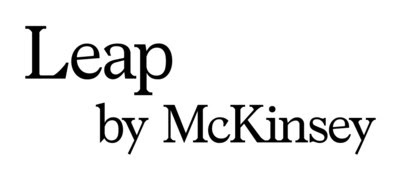55% of Global Business Leaders Say New-Business Building Is a Top Priority
NEW YORK, Dec. 8, 2021 /PRNewswire/ — Today, Leap by McKinsey, the new-business building practice of global management consulting firm McKinsey & Company, released its second annual survey titled, The State of New-Business Building. The research, which surveyed executives at large scale organizations on how they are finding sources of growth for their companies, revealed that new-business building is a global phenomenon.

A quarter of CEOs around the world see actively integrating new products and services, or building completely new business models into their ongoing strategies, as a top strategic priority — more than doubling in recent years. Around the world, 81% of business leaders are prioritizing new-business building as a means to protect against industry disruption. This research launches at a time when it is essential to develop new revenue streams to meet both customer and market demand, and the opportunity is significant. By 2026, executives expect 50% of global revenues will come from products, services, and businesses that don’t exist today.
“While the global pandemic forced CEOs and business leaders to take a step back and better understand rapidly changing customer needs, the elevated prioritization of new-business building throughout 2021 has made it clear that it will be increasingly the critical lever for strategic growth moving forward,” said Ari Libarikian, Senior Partner, and co-leader of Leap by McKinsey. “However, building a new business is no easy feat with the majority of new businesses failing to scale. Moreover, as leaders look towards future expansions that will thrive in the marketplace, they must consider aspects like sustainability and diversity & inclusion in forming and building new businesses in order to take advantage of this massive opportunity.”
Compelling findings from the research include:
Sustainability — Addressing sustainability is one of the largest areas of opportunity when developing new-business building strategies, yet global business leaders are not actively utilizing the opportunity to address climate change.
- While 92% are looking to take on sustainability issues in their new business models, only 22% are tracking against goals related to the company’s carbon footprint or other environmental impacts.
- Furthermore, almost half (43%) of business leaders acknowledged that sustainability is a top-three trend to address through new-business building.
“Sustainability has an increasing presence in the minds of business leaders around the world, however, executives often spend time worrying rather than embracing the countless opportunities to meet environmental challenges and customer demands. Successful new-business building ventures will incorporate the many facets of sustainability, and as such, business leaders must begin to track and report on their progress in ways similar to their companies’ other products and services,” said Ralf Dreischmeier, Senior Partner, and co-leader of Leap by McKinsey.
Structure & Diversity — McKinsey’s research also highlights how organizations can be successful when launching new businesses. This includes prioritizing core CEO support, building an effective organizational structure, pursuing active acquisitions, better understanding customers, and hiring diverse leaders.
- While it is imperative that organizations continue to tap into the abundance of new-business building opportunities, launching a successful venture is difficult, with more than four of five new businesses globally still not achieving $50M annual revenues at least four years after launch.
To further ensure new business entities are profitable, experience and support from parent companies is key.
- McKinsey found that in every region of the world, serial business builders with three or more corporate venturing experiences deliver significantly more revenue (1.4x) than their less experienced counterparts.
- Furthermore, it is essential to prioritize diversity when selecting leadership, with women-led businesses outperforming their peers by 10%. Women continue to be vastly underrepresented, currently leading just 14% of new business ventures despite this finding.
- New businesses with a core company CEO who works to provide ring-fenced investments in the new business and that set realistic internal expectations, are willing to invest in growth at the expense of immediate profitability, and publicly support the new company are much more likely to succeed.
The data for the 2021 State of New-Business Building Survey, which incorporates responses from over 1,100 business leaders covering all aspects of business building, can be accessed in its entirety on http://mckinsey.com/state-of-
About Leap by McKinsey
Leap by McKinsey works with established organizations to build and scale innovative new businesses from scratch. Together, we help our clients strengthen capabilities, adopt the right technologies in the right industries, and break out of the status quo. Leap draws on McKinsey’s expertise in business, design, and technology. We have more than 700 founders, designers, engineers, marketers, and analysts that collaborate closely with McKinsey Digital’s team of over 5,000 experts across digital and analytics. In collaboration, we help clients create holistic and sustainable impact. Don’t just look to the future, let’s Leap.
The 2021 State of New-Business Building report is Leap by McKinsey’s second annual global survey on growth strategy, new-business building, and corporate venturing. This McKinsey Global Survey was conducted between July 6 and July 23, 2021, and garnered responses from 1,178 C-level executives, senior managers, and business-unit, department, or division heads representing the full range of regions, industries, company sizes, and functional specialties. To adjust for differences in response rates, the data are weighted by the contribution of each respondent’s nation to global GDP. The findings from our survey help business leaders to understand best practices in corporate new-business building and compare their organizations’ approaches and performance with a global benchmark to make informed decisions. For more information, visit http://mckinsey.com/state-of-
Logo – https://mma.prnewswire.com/
